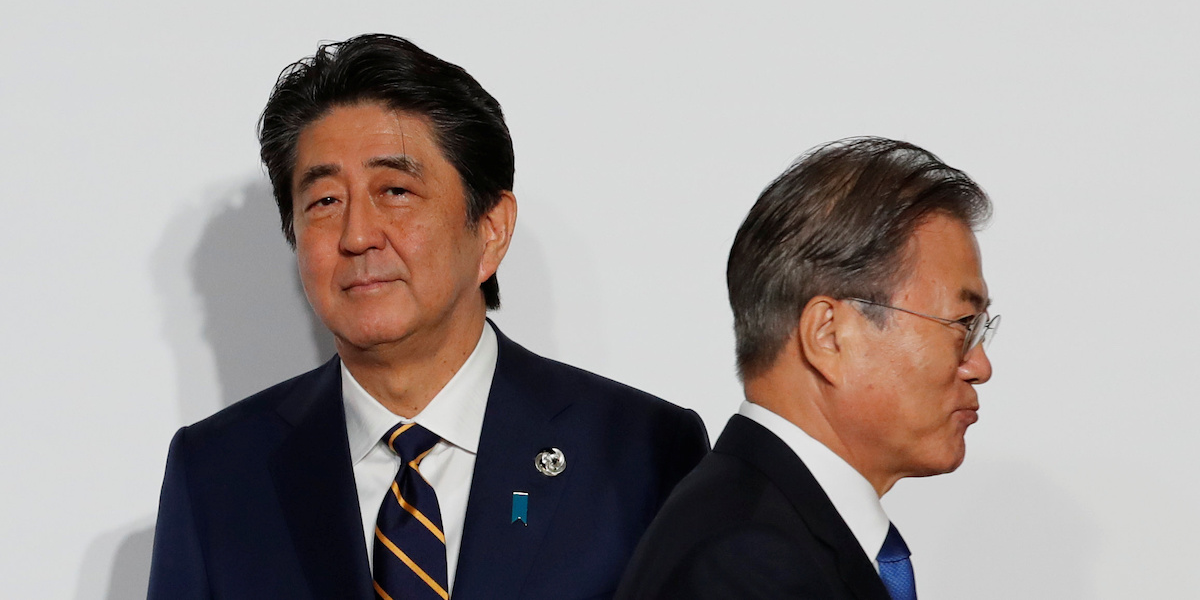- Japan and South Korea are locked in their own trade war, which has dramatically ramped up over the past month.
- South Korea’s government on Monday announced it would officially drop Japan from its list of preferred trading partners and was placing Japan in a newly created category of downgraded countries.
- As part of the new category, South Korean exporters of “strategic” goods will have to submit more paperwork and wait longer before they can sell to Japan.
- Japan earlier this month removed South Korea from its own list of preferred trading partners and restricted key exports.
- Relations between Seoul and Tokyo deteriorated last year after South Korea’s Supreme Court ordered Japanese companies to compensate forced Korean laborers during World War II, a debt Japan says it already repaid in 1965.
- Visit Business Insider’s homepage for more stories.
South Korea has created a new category of country as it seeks to punish Japan amid ongoing tensions.
South Korean officials on Monday announced the country would officially drop Japan from its “white list” of countries with fast-track trade status and downgrade it to a newly created category of trading partners starting in September, Reuters reported.
The new trade category is for countries that don’t adhere to “international export control principles,” Reuters cited South Korea’s industry minister, Sung Yun-mo, as saying.
Japan has been listed as one of those nations over accusations it engages in “inappropriate trade practices,” Reuters reported, paraphrasing the senior South Korean trade official Park Tae-sung.
Park, however, did not reveal his country's specific accusations against Japan.

As part of this new, downgraded category of countries, Japan will still be able to trade with South Korea but will be subject to lengthier export application processes.
South Korean companies exporting "strategic" goods to Japan will have to submit five application documents, instead of the previous three, with the waiting process increased to 15 days from five, the Nikkei Asian Review reported.
Seoul's announcement came 10 days after Japan dropped South Korea from its "white list" of favored trading partners - a move that will require Japanese exporters of "strategic" products to go through additional screening to ensure their products won't be used by the South Korean military or weapons industry.
Japan's new restrictions take effect August 28. South Korea's trade ministry denied that its latest move was in retaliation against those of Japan, the Nikkei Asian Review said.
Tokyo is yet to issue a formal response to Monday's announcement.

Decades-long tensions threaten to boil over
Decades-long tensions between Seoul and Tokyo bubbled to the surface last year after the South Korean Supreme Court ordered Japanese companies to compensate South Korean laborers who were forced to work for them during World War II.
Japan colonized the then-united Korean Peninsula in 1910 and ruled it with an iron fist until 1945. During those 35 years, Japan forced hundreds of thousands of Koreans to fight and work and made many women provide sex for their imperial overlords.
Japan and South Korea normalized diplomatic relations in a 1965 pact that saw Tokyo give Seoul grants worth $300 million and loans of $200 million over 10 years.
The Japanese government maintains that the 1965 treaty had settled all colonial-era debts, while recent South Korean governments have said Japan's repayments cover only some debts.
Many Japanese companies refused to comply with last year's South Korean Supreme Court order.

In early July, Japan ramped up the trade dispute by restricting exports of three high-tech materials - fluorinated polyimide, photoresists, and hydrogen fluoride - to South Korea.
South Korea's booming electronic industry requires those materials for the production of semiconductors and display screens.
Last week, Seoul said it would invest 7.8 trillion won ($6.48 billion) in the research and development of domestically-produced materials, parts, and equipment over seven years, Reuters reported.
"The government will pursue an elaborate and detailed strategy to more substantively develop our economy by taking Japan's economic retaliation as a chance to turn good out of evil," South Korean President Moon Jae-in said at the time, according to Reuters.
Moon has heavily evoked Japan's colonial past during this trade spat. "We will never again lose to Japan," he said earlier this month.

Some South Korean citizens have also threatened to boycott Japanese goods - from anime films to beer - and two South Koreans have committed acts of self-immolation to protest deteriorating relations.
Earlier this month Marc Knapper, the deputy assistant US secretary of state responsible for Japan and Korea, called on the two countries to do some "soul searching" to improve their relations.
"Japan and Korea each suffer consequences when their bilateral ties worsen and we believe that each bears responsibility for improvement for their relations," Knapper told the Heritage Foundation think tank in Washington, DC, according to Reuters.
"We believe that prudence is required to prevent tensions contaminating the economic and security aspects of Japan-South Korea ties."

